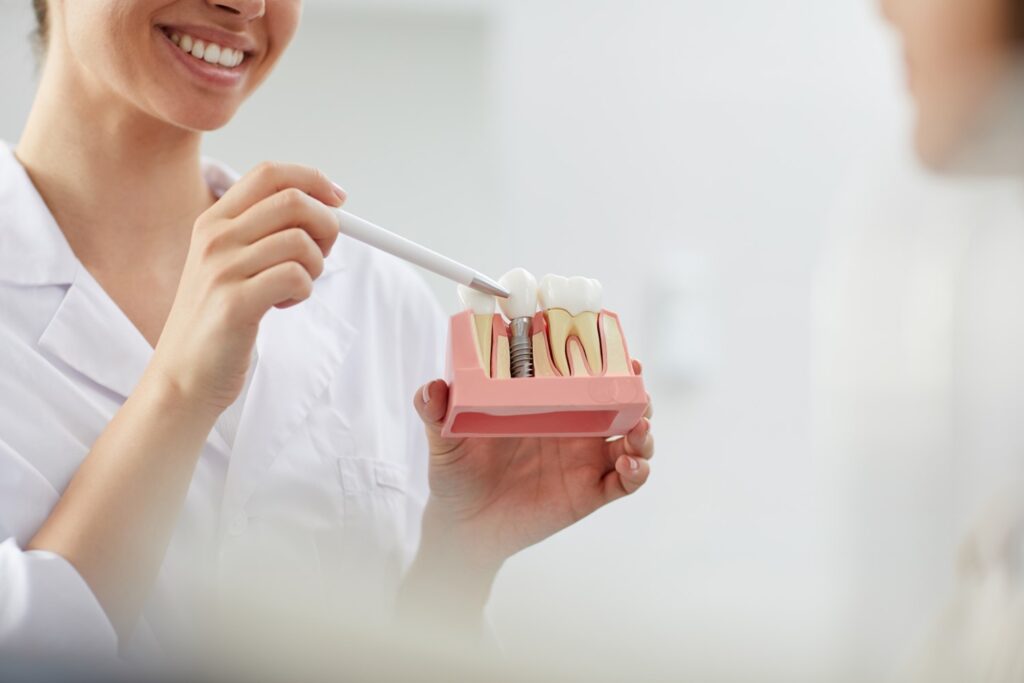
Dental implants are artificial tooth roots that are used to replace missing teeth. They are typically made of titanium or another biocompatible material that can fuse with the bone in the jaw to provide a stable foundation for a replacement tooth or bridge.
Dental implants can be used to replace a single missing tooth, several missing teeth, or even a full arch of teeth (full mouth implants). They are often preferred over other tooth replacement options such as permanent dentures or bridges because they are more stable and natural-looking, and they can help preserve the integrity of the jawbone.
Why Does a Patient Need Dental Implant?
Advantages of Dental Implants:
Types of Dental Implants
Endosteal implants: These are the most common type of dental implant and are placed directly into the jawbone. They are typically made of titanium and are shaped like small screws, cylinders, or plates.
Subperiosteal implants: These are placed under the gum tissue but above the jawbone. They are often used for patients who have a shallow jawbone and cannot undergo a bone graft.
Zygomatic implants: These are longer than traditional implants and are anchored in the cheekbone (zygomatic bone) rather than the jawbone. They are used for patients who have significant bone loss in the upper jaw.
All-on-4 implants: This type of implant uses only four implants to support a complete set of replacement teeth. It is often used for patients who have multiple missing teeth or need a full arch of teeth replaced.
Mini implants: These are smaller than traditional implants and are used for patients who have less bone density or are not candidates for traditional implants. They are often used to stabilize dentures or replace small teeth.
The type of implant that is best for you will depend on your individual needs and the recommendations of your dentist or Implantologist.
Preparation Before Dental Implantation
Your dentist will examine your mouth, takes impressions of gums and teeth, and takes dental X-rays
Bone Grafting: Uses bone from other parts of your body (jaw/hip/chin) or artificial bone material
During Dental Implantation
A small part of the gums is cut where the implant is placed. This helps to access the tooth socket where your tooth is missing
Cutting and Drilling: your dentist drills into the bone to place the metal implant or post itself into the hole in your bone. After the implantation, the incision on the gums is stitched and allowed to heal.
After Dental Implantation:
Post 3 to 6 months of the procedure, you will have to undergo the second part of the traditional dental implantation. This involves making a new cut to expose the implant. A healing cap is screwed atop the stud.
Healing Cap Removal: The healing cap induces the surrounding gum tissue healing. After a couple of weeks, the healing cap is taken off.
Abutment and Crown Placement: The abutment is placed as a support element to the final crown. The abutment is necessary to ensure a tight fit for the crown that won’t easily be dislodged due to human biting forces.
How Painful Are Dental Implants?
Mostly, people who received dental implants say that the procedure involves very little discomfort. The procedure is performed under local anesthesia hence most of the patients report that dental implantation is less painful than a tooth extraction.
Conclusion
Dental implants are an effective and long-lasting solution for replacing missing teeth. They provide numerous benefits, including improved chewing and speaking abilities, enhanced appearance, and preservation of bone structure. While the process of getting dental implants may take several months and require multiple appointments, the end result is a permanent solution that can last a lifetime with proper care. It is important to consult your dentist to determine if dental implants are a suitable option for you.